ITV's Endeavour: In Defence of British Crime Drama
In our 'golden age' of television, somebody must defend the British crime dramas that are deserving of our praise.
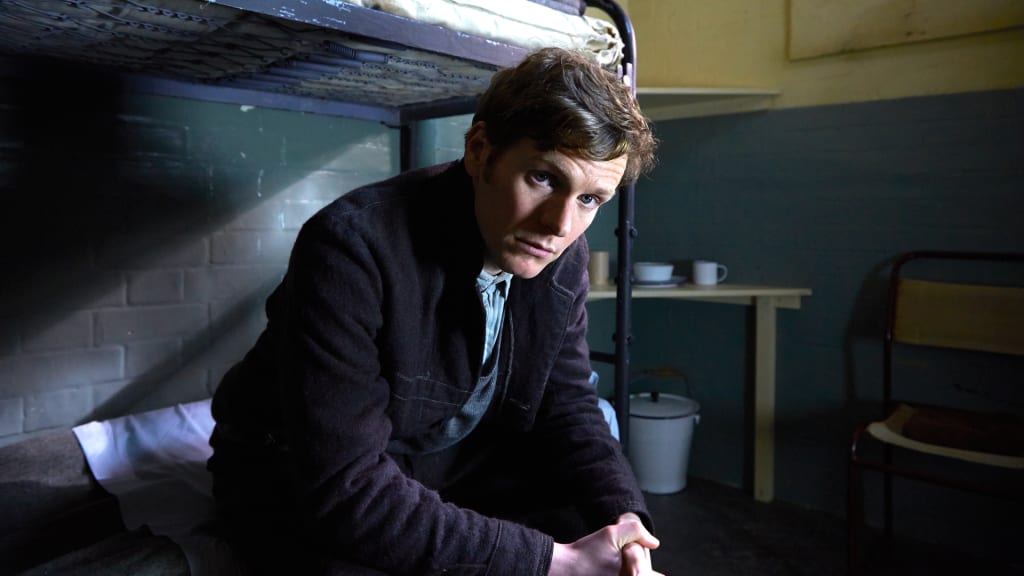
The current “golden age” of television has, in recent years brought the state of British programmes into question. There have been countless, heated debates in pubs, cafes, living rooms and online forums over which country's output is better: America or Britain?
Due to the former's run of stellar hits such as Breaking Bad, True Detective, Game of Thrones and Orange Is the New Black, the US often comes out on top, with the suggestion that Britain needs to follow their style and rectify their recurring problems.
However by stating this, the over-zealous critics of British shows are sometimes overlooking several things.
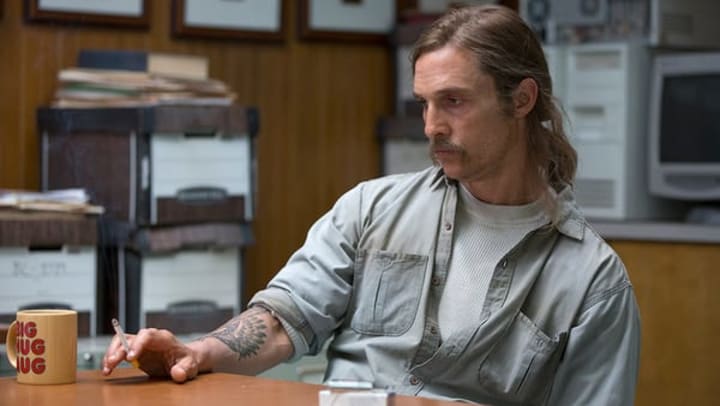
Matthew McConaughey- HBO's True Detective
Firstly, that they are vastly underestimating the content of British channels. Though this is obviously subject to personal preference, the BBC, ITV and Channel 4 have produced content that has received popular acclaim and cultural status such as Doctor Who, Sherlock, Humans, the earlier Misfits series, Broadchurch, Wolf Hall and Doctor Foster, yet to many people these are seemingly not in the same league.
Perhaps it is that these series are not beholden to the boxset-lover's preference for longer series with complex arcs? Or is it that the violence is often reigned in, and has yet to meet the standards of brutality and cynicism of their American counterparts. One notable exception to this rule was of course the BBC’s Ripper Street, which was cancelled and then retrieved by Amazon Prime.
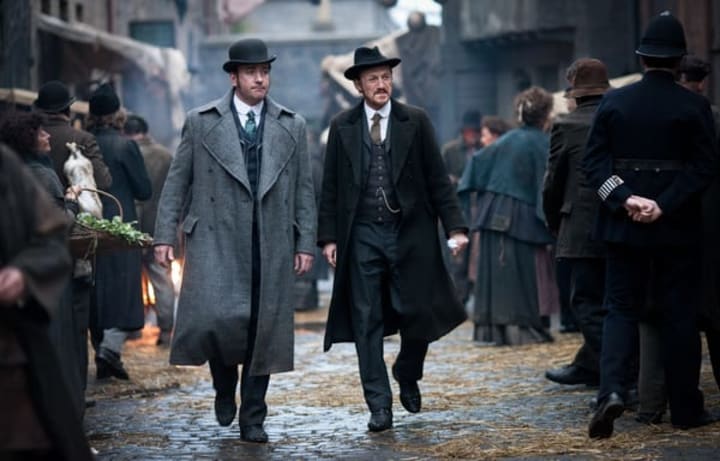
Ripper Street.
Because of the growing and aging population, perhaps it is that the BBC and ITV amongst others feel more adept in catering to family and older audiences with less shocking scenes?
Another problem is that due to the presence of Hollywood and the bigger studio systems have the resources, financial backing and infrastructure to fund and produce these larger, blockbusting shows.
Admittedly, the British cinema system has seen a revival of sorts since the Harry Potter series, with many major hits such as Star Wars: The Force Awakens having production bases in the southern counties; however the British system clearly does not churn out the same amount of movies or garner the same diverse audiences as America’s output does.
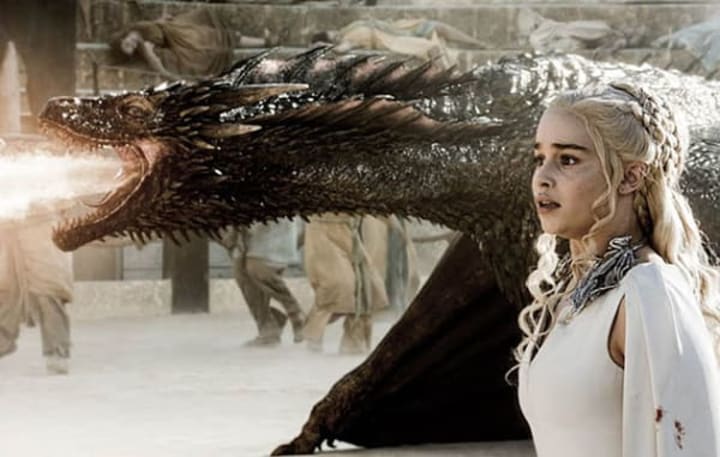
Emilia Clarke in Game of Thrones.
And, is the British television output that unsatisfactory in the first place?
Scouring the comment sections of various DVDs it would seem that Britain is still known for its dramatic crime and detective stories; these have their roots in their printed form, which began in the Victorian period with detectives such as Sherlock Holmes, as a reaction to the upheaval of society due to the growth of cities and the perceived moral decline that was born out of it.
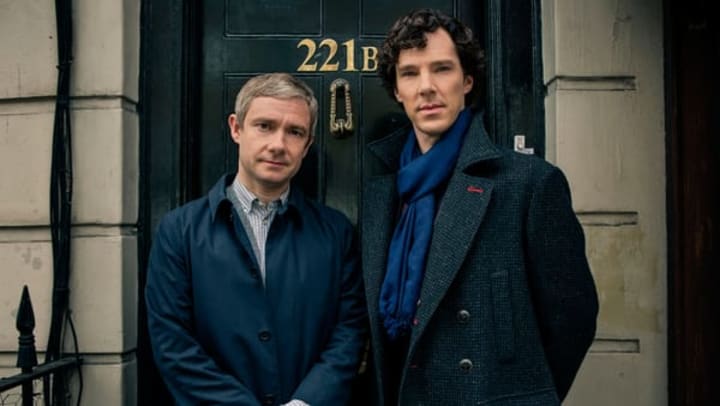
BBC Sherlock - a modern adaptation.
Indeed, these detectives who stood slightly apart from the masses and could recognise the "rot," sought to weed out the renegades who disrupted the order of things.
This tradition continues today, but now the lines of good vs evil and right vs wrong are often blurring such as in Broadchurch and Happy Valley. And seemingly arriving into this canon, without the fanfare of its contemporaries is the sumptuous and atmospheric Endeavour from ITV.
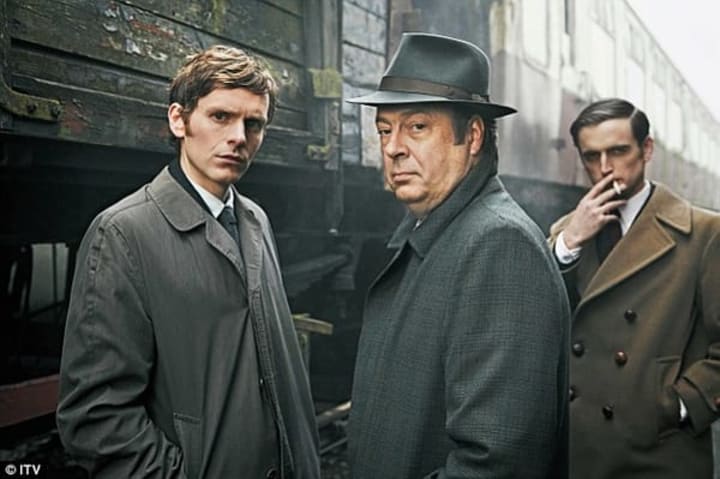
ITV's Endeavour.
Like Sherlock, it follows in the tradition of being adapted from literature; Endeavour is a prequel series to ITV’s Inspector Morse, which was adapted from Colin Dexter’s crime novels.
Warmer and cosier than the harrowing Broadchurch, Endeavour charts the early days of the intelligent Oxfordshire police detective in the 1960’s. It currently has three series consisting of four episodes in each.
Where modern shows such as True Detective and Broadchurch reel in the aftermath of a singular event, Endeavour’s structure features the more traditional villain or case per episode.
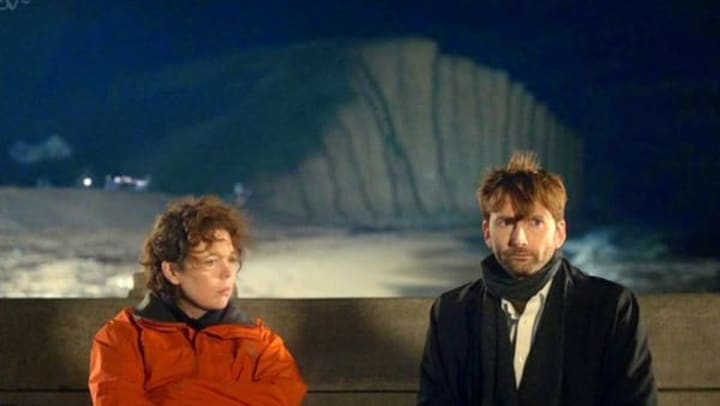
David Tennant & Olivia Colman in ITV's Broadchurch.
This is not to suggest that they are completely autonomous since small narrative strands continue throughout the show, and there are scattered references to events which will occur in the original Inspector Morse.
What’s refreshing is that, unlike the often uneven writing of its BBC rival in Sunday evening television, Inspector George Gently, it is planned and written by Russell Lewis so its characterisation and tone remain strong, consistent and well balanced. The dialogue is often unshowy, but solid, with surprisingly powerful emotional exchanges here and there.
Below, an emotional Morse questions his superior officer about how he copes after witnessing and investigating horrific acts:
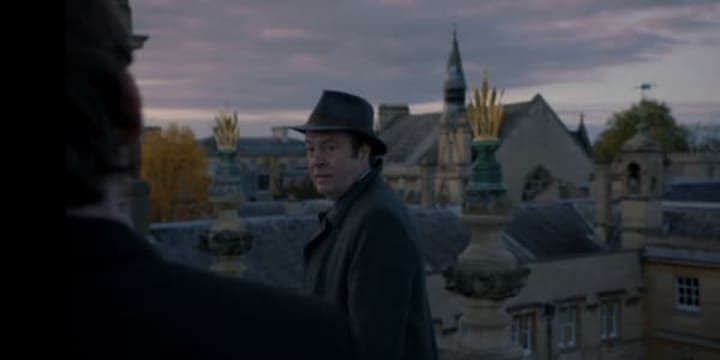
Morse: How do you do it? Leave it at the front door?
Thursday: 'Cause I have to. Cases like this will tear a heart right out of a man. Find something worth defending.
Morse: I thought I had! Found something.
Thursday: Music? I suppose music is as good as anything. Go home. Put your best record on. Loud as it'll play. And with every note, you remember: That's something the darkness couldn't take from you.
It all looks fabulous as well.
Set in the 1960’s, the fashions and lifestyles are lovingly recreated. Additionally, the setting allows for the issues of the day to be tackled, and sometimes this fuel the plot, but not as much as other series such as Inspector George Gently where it occasionally dominates the series.
Moreover, the fact that these issues are attacked with hindsight and a modern viewpoint, George Gently occasionally feels like it is checking off a list of themes to encounter, such as racial tensions, feminism, counter-culture etc.).
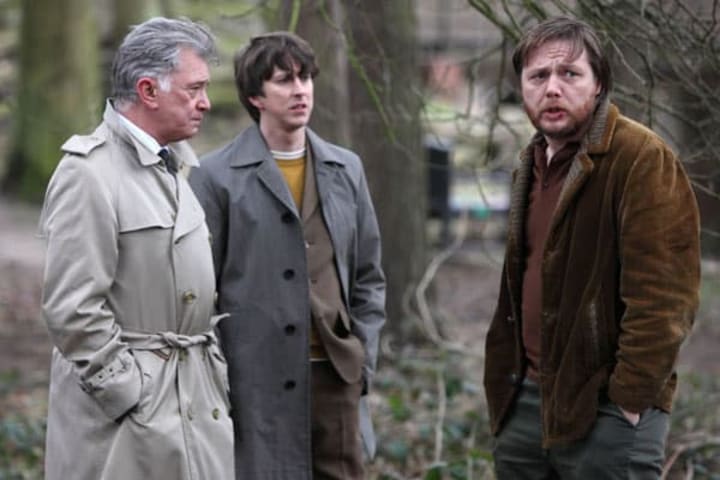
A still from BBC's Inspector George Gently
Endeavour doesn’t shoehorn them in, but uses them as a backdrop, yet even so it does feature some challenging content. Areas of the second series explores institutionalised child abuse and police corruption, and thus subverts the common view held by nostalgic older viewers who dismiss the events within the series as isolated incidents, stating that that things were “better in the old days.”
Though fans of the original show will already know what Morse’s future will hold, the series ensures that there are enough surprises and twists in store to compliment it grand visuals.
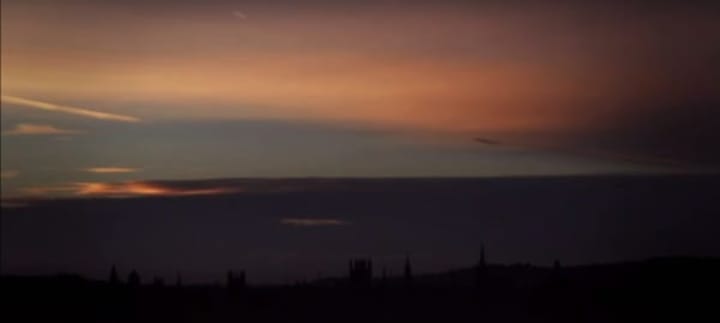
Oxford's skyline.
Featuring the towering spires of Oxford, and suffused with a golden-brown glow, its shots of the university, countryside, shops and home interiors recollect this bygone time vividly; the subject matter is elevated by its cinematic composition of its shots and the fabulous production values elevate the show.
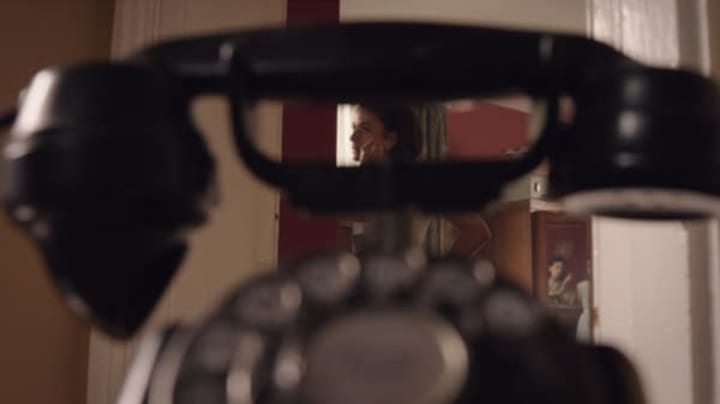
Stylish composition and 60's aesthetic.
Coupled with its heavy use of famous classical and opera music (which the protagonist favours) the series is melancholy and meditative.
Similarly, the cast excels, giving shades and textures to characters that could otherwise have been one dimensional. The stern and authoritative Anton Lesser gives progressively lighter human touches to his character Chief Superintendent Bright as the second and particularly third season progresses.
Endeavour also features the excellent Roger Allam as DCI Fred Thursday, the commanding and stoic, but kindly mentor to counterpoint Shaun Evans’s intelligent yet irascible Morse.
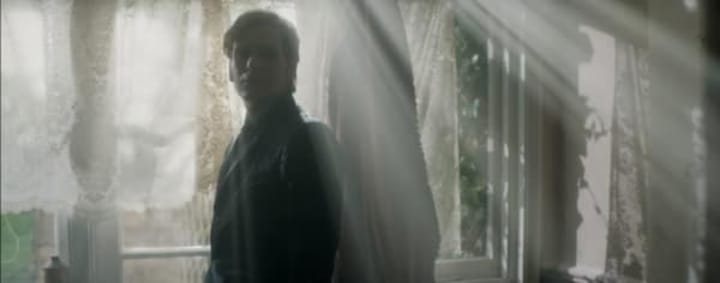
Sean Evans - DC Morse.
In lesser hands the brittle Morse would be unlikable and overly rude, but Evans adds slight touches of vulnerability to show the sensitive, cultured soul beneath. His Morse is principled and regimented, but still human and never predictable.
Like so many other detective shows, Thursday and Morse’s relationship is the main focal point of the series, powerful through their combined intelligence but repeatedly disagreeing over the flexibility of the law and the hierarchy of the Oxford police force.
Their partnership is underpinned by small doses of wry humour, but it is tinged by the knowing sadness that, because of the character’s position and fate in the original series, their association cannot continue forever.
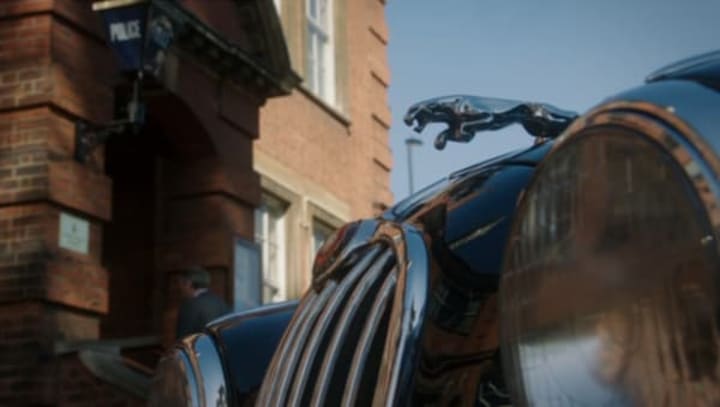
The Jaguar - a hallmark of Inspector Morse.
To this writer, shows like the understated Endeavour prove that British crime drama finds fresh ways to innovate on its own terms and in its own way. And whilst there are questions about the nature and future of British television, shows like this should not be outright discarded because it does not delve into the sensationalism, cynicism and gloom of its contemporaries.
We should accept and appreciate the variation of great drama that we have, which comes to us from different places and in different forms.
Roger Allam has recently confirmed that the fourth series will go into production soon and air earlier next year. Be assured that this viewer will be there next year, ready before the screen in eagerness to witness, as Euan Ferguson for the Guardian describes:
“the synergy within ITV Drama that perfectly demonstrates how writerly ideas can simply spin and explode off the page and exponentially continue to delight.”
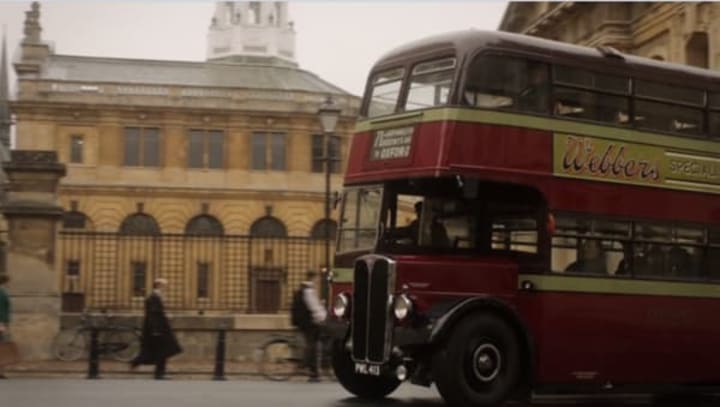
1960's Oxford - wonderfully realised.
About the Creator
Max Farrow
A fanatical film-watcher, hill-walker, aspiring author, freelance writer and biscuit connoisseur.
These articles first appeared on Movie Pilot between Jan 2016 and Dec 2017. Follow me on Twitter @Farrow91


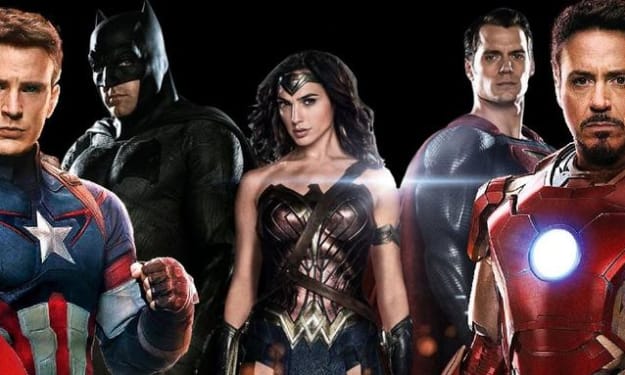



Comments
There are no comments for this story
Be the first to respond and start the conversation.